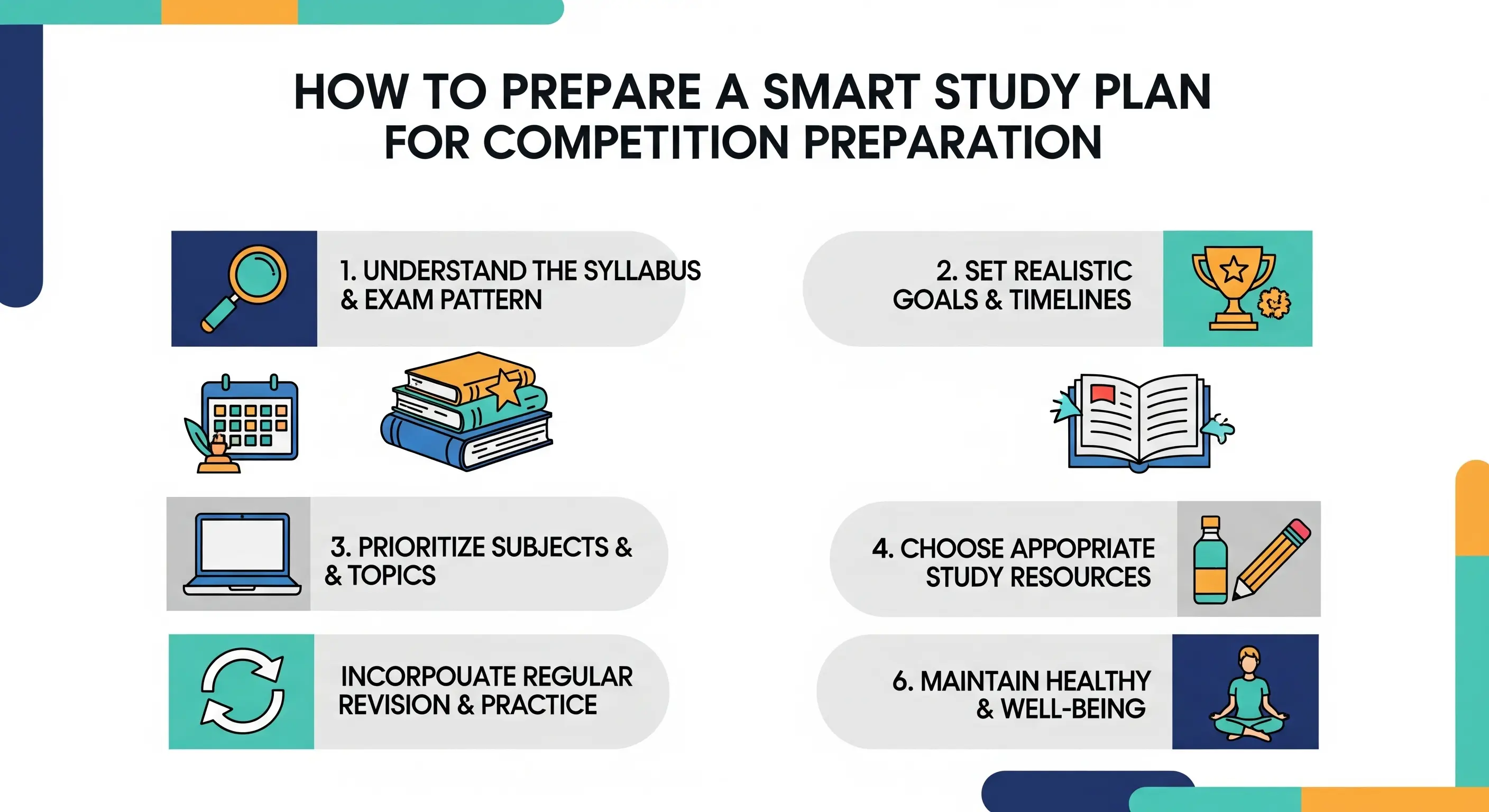Competitive exam or contest preparation is not about working harder, it's about working smarter. Thousands of aspirants take months, sometimes years, to prepare, but only those who prepare with a systematic and smart study plan are able to crack it. The fact remains that competition preparation needs a combination of strategy, discipline, and balance.
If you are a person who wants to crack JEE, NEET, UPSC, SSC, or any other competition, the first step is properly planning your study time. A good plan allows you to complete the syllabus, revise several times, remain stress-free, and have time for self-care too. Let's divide how you can create an intelligent study plan that actually works.
-
Know the Syllabus and Exam Pattern
Before you lay your hands on your textbooks, it is important to know what to study. There is a set syllabus and a specific pattern—types of questions, topic weightage, and marking scheme—that each exam has.
Why is it important?
Students spend time studying unwanted topics or missing out on essential ones. By studying the syllabus, you can set priorities based on the important ones.
Action Step:
- Download the latest official syllabus from the exam authority’s website.
- Highlight high-weightage topics based on previous years’ question papers.
Example: If you’re preparing for NEET, Biology carries the maximum weightage. For IIT-JEE, focus on problem-solving in Physics and Mathematics.
-
Set Realistic Goals
A study plan without goals is like a ship without a compass. But your goals must be realistic and achievable.
Bad Goal: “I will complete the whole syllabus within one month.”
Good Goal: “I will study 2 chapters of Physics this week and revise them at the weekend.”Action Step:
- Daily goals: complete one topic or solve 30 MCQs
- Weekly goals: study a subject chapter + practice tests
- Monthly goals: cover at least 25% of the syllabus
By doing so, you'll be less stressed and more encouraged.
-
Design a Timetable for Yourself
Each student is unique. Some like to study late at night, while others are morning types. That's why adopting another person's timetable might not suit you.
- Morning: Learn something new and challenging (fresh mind).
- Afternoon: Practice what you learned in the morning.
- Evening: Mock tests and problem-solving.
- Night: Short notes, flashcards, or light revision (if you study late).
Sample Study Plan for a Day
- 6:00 AM – 7:00 AM: Yesterday's topic quick revision
- 7:00 AM – 10:00 AM: Study a challenging subject (Physics, Math, or Chemistry)
- 10:00 AM – 10:30 AM: Break
- 10:30 AM – 1:00 PM: Study another subject or MCQ practice
- 1:00 PM – 2:00 PM: Lunch + Rest
- 2:00 PM – 4:00 PM: Notes revision + easy subject (such as GK or English)
- 4:00 PM – 5:30 PM: Mock test practice/previous papers
- 5:30 PM – 6:00 PM: Short break, walk, or relaxation time
- 6:00 PM – 8:00 PM: Intensive problem-solving (numerical or case studies)
- 8:00 PM – 9:00 PM: Dinner + Relaxation
- 9:00 PM – 10:30 PM: Rapid review of the day's work + plan for the next day
-
Apply Active Learning Methods
Merely reading books won't do for competitive exams. You must remember and recall at speed.
- Pomodoro Technique: Study 25 minutes, break 5 minutes; repeat.
- Feynman Technique: Explain the concept in simple language as if to someone else.
- Mind Mapping: Use diagrams/flowcharts to link topics visually.
- Practice-Based Learning: Prioritize previous years' papers and mock tests.
-
Prioritize Revision
It’s a common mistake to cover new topics but ignore revision. Without revision, you will forget most of what you read.
Action Step:
- Revisit topics within 24 hours of first studying them.
- Plan weekly revision sessions.
- Create short notes or flashcards for last-minute reviews.
Remember: Revision is retention.
-
Balance Between Subjects
It’s natural to like some subjects more than others. But ignoring weaker subjects can reduce your overall score.
- Spend extra time on difficult subjects, but don’t neglect the strong ones.
- Follow the 2:1 formula: two study slots on your weak subject and one slot on your strong subject.
Example: If you are weak in Physics but good in Biology, take extra time to solve Physics numericals but continue to practice Biology MCQs every day.
-
Look After Your Health
- Sleep: At least 6–7 hours each day for memory consolidation.
- Exercise: 20–30 minutes walking, yoga, or stretching.
- Nutrition: Nuts, fruits, green vegetables; avoid junk food.
- Breaks: Frequent short breaks to sustain focus and prevent burnout.
-
Be Consistent and Motivated
Most students begin well but get demotivated after a couple of weeks. Competitive exams are a marathon, not a sprint.
- Stay disciplined even when motivation dips.
- Reward small wins (e.g., finishing a chapter).
- Avoid distractions like excessive social media.
- Keep positive peers or mentors who motivate you.
-
Monitor Your Progress
- Maintain a study diary to note daily topics completed.
- Attempt a mock test every week.
- Adjust your schedule if you’re lagging or a subject feels tough.
-
Be Flexible and Adaptable
Things don't always go according to plan—perhaps a subject takes longer than you anticipate, or you get ill. Don't worry. Be flexible.
- If you miss a day, work around the schedule rather than worrying.
- If an approach isn't working, switch to another one.
- Remember, the objective is progress, not perfection.
Final Thoughts
Developing a smart study plan for competition preparation is not cramming 12 hours a day. It's spending your time judiciously, staying consistent, and balancing study and health.
